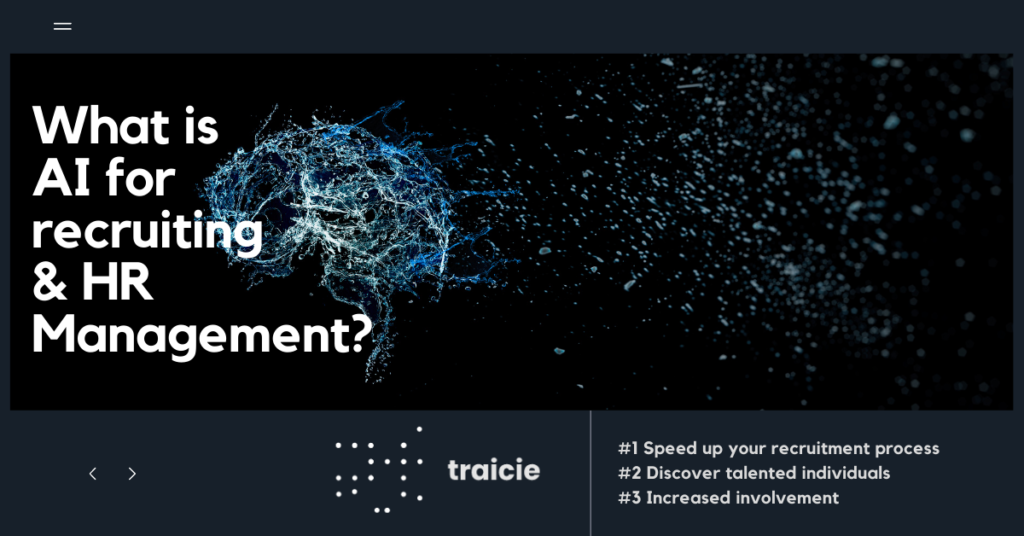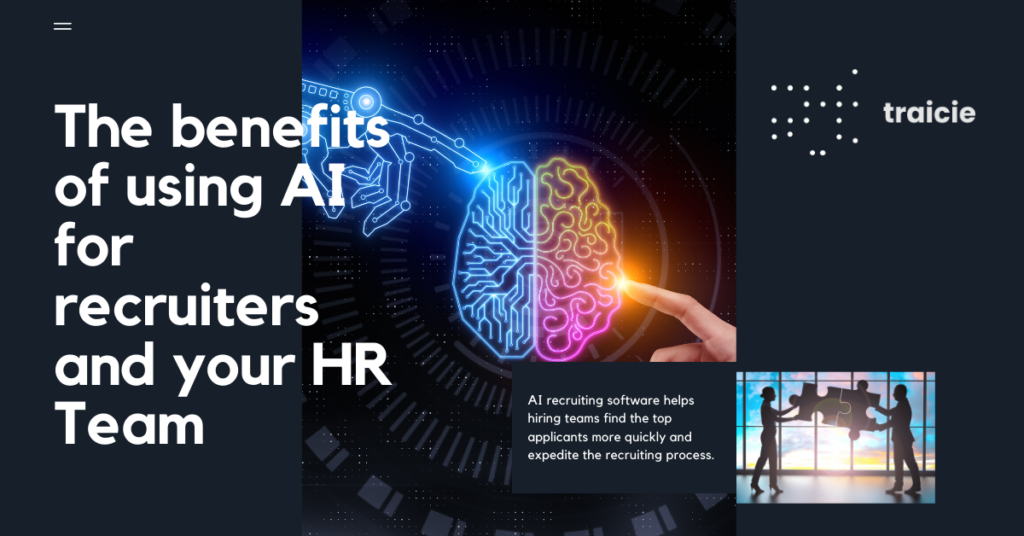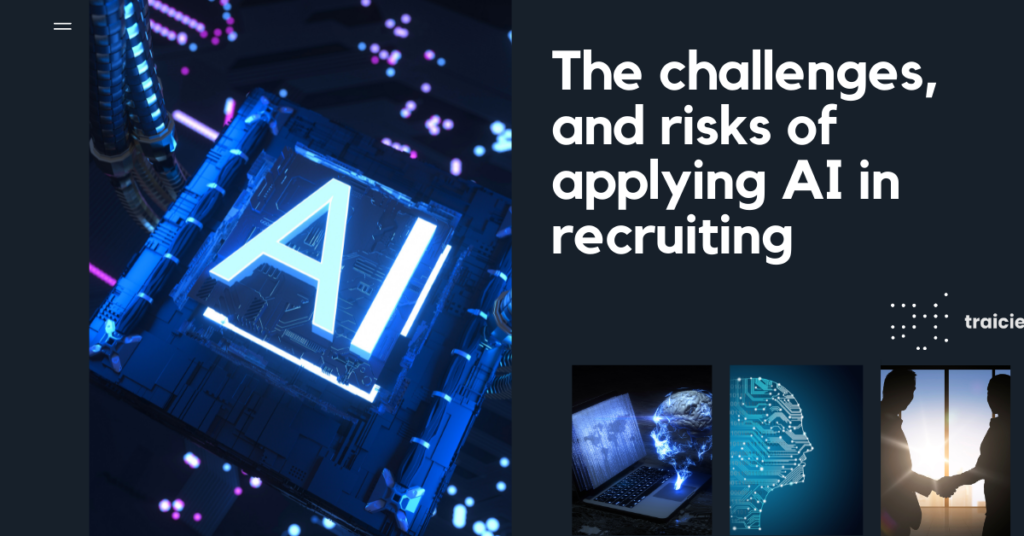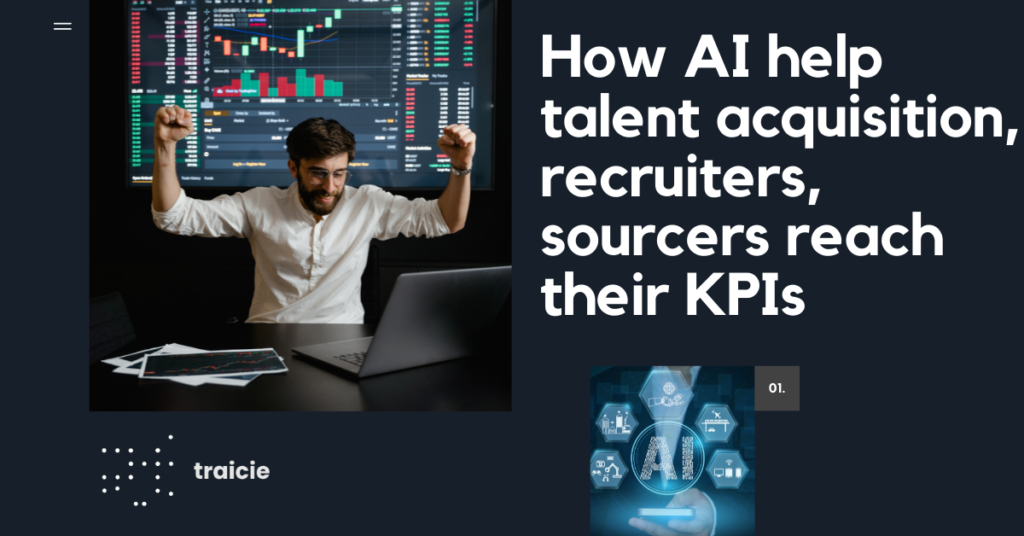The environment of HR technology includes crucial components like AI Artificial intelligence for HR, and recruiting solutions. AI-powered HR technologies that are directly linked with the ATS bring a level of talent intelligence to the hiring process by automatically screening hundreds of resumes and reducing time-consuming manual processes.
In this article, Let’s find out more about how AI artificial intelligence benefits HR machine learning and affects the recruiting process of the Human Resources department in your company.
What is AI for recruiting and HR Management?
Artificial intelligence (AI) recruiting is the application of AI to the hiring procedure. AI offers a variety of applications that can assist recruitment professionals in hiring more quickly, intelligently, and without bias, from automatically screening prospects to managing communication to better interview and analyzing candidates.
AI recruiting aims to automate or streamline several steps in the hiring process. As a result, recruiters can work more quickly, select applicants who are a good fit and devote more time to tasks that can only be completed by people, such as developing meaningful partnerships.

The panoptic human component of human resources mixed with the intelligence of technology will result in businesses having upgraded and evolved conditions for their applicants and employees. Additionally, HR AI will support the promotion of the importance of achieving results more quickly and effectively.
Coherent computing techniques and preprogrammed algorithms are used by artificial intelligence to make judgments in real-time. The field of human resources will be impacted by artificial intelligence.
The benefits of using AI for recruiters and your HR Team
Organizations can benefit in a variety of ways from the use of artificial intelligence to streamline recruiting, including time savings, increased diversity, and improved candidate experiences.
Speed up your recruitment process
No longer do businesses receive a regular stream of applications from ideal prospects knocking on their doors. If your hiring procedure is ineffective, you run the danger of losing your top candidates to the opposition. The fewer proposals you’ll likely face in the recruiting process, the easier it will be for you to obtain excellent people.
AI recruiting software helps hiring teams find the top applicants more quickly and expedite the recruiting process.
Discover talented individuals
The cost of a poor hire, according to the U.S. Department of Labor, is at least 35% of the employee’s first-year salary. Additionally, it can cost up to $200,000 to find, hire, and onboard a new employee. Not only is it expensive to hire the incorrect people, but it may also negatively affect morale, output, and profits.
Employers can enhance their capacity to identify and select the most suitable candidate from a pool of candidates by using AI-powered recruitment tools. In addition to conducting interviews that result in stronger hiring, AI can assist recruiters in automatically sorting through hundreds of resumes to identify the most qualified candidates for the position.

The potential of AI to use data to standardize the matching between candidates’ experience, knowledge, and abilities and the requirements of the job holds the promise of enhancing the quality of hire. It is anticipated that this increase in job matching will produce happier, more productive employees who are less likely to leave their jobs.
Early findings are quite encouraging. Companies that were early adopters of AI-powered recruiting tools have seen cost per screen drop by 80%, revenue per employee increase by 8%, and turnover fall by 43%.
Increased involvement
Nobody wants to feel like a faceless piece in the hiring process. Recruiters may build stronger relationships with candidates and provide a better experience by designing hiring procedures that are both scalable and effective.
According to one study, individuals who have been given a job are 45% more likely to accept when conversational AI has been used in the recruiting process. Why? Applicants are more likely to become employees if they have a strong sense of connection to the company during the hiring process. Recruiters and hiring managers can learn more about each prospect by employing an AI recruiting tool that can decipher interview exchanges. As a result, there are deeper interactions that result in genuine interactions and eventually more motivated prospects.
The challenges, and risks of applying AI in recruiting
While using machine learning and artificial intelligence in the hiring process offers many advantages, there are risks as well.
AI can pick up on human prejudices
To begin with, for AI to learn how to screen candidates as precisely as a human recruiter, it needs a lot of data. Additionally, AI can pick up on human prejudices even though it can lessen bias in the hiring process. The ability of artificial intelligence to draw conclusions and patterns from vast amounts of data and then make predictions based on those conclusions is a key feature. This is precisely why AI recruiting is so effective, but it can also make its algorithms susceptible to prior prejudices.
AI for HR needs lots of data.
Secondly, To successfully simulate human intelligence, AI often needs a lot of data. For instance, machine learning-based AI requires a large amount of data to learn how to evaluate candidates as precisely as a human recruiter.

The fear of new HR AI technologies
Last but not least, HR professionals are frequently swamped with the most up-to-date trend, which quickly fades. It makes sense that leaders in recruiting and talent acquisition might be wary of any technology that claims to make their tasks simpler or improve the HR ecosystem. They want to be certain that any software they choose to automate one of their tasks will be able to perform the task as well as they can.
Innovations in AI for recruiting – Digital Tranformation in HR
There are several potential uses for artificial intelligence in recruiting, including the automation of time-consuming, high-volume processes like candidate pre-qualification and resume filtering.
How Intelligent resume screening software?
- By utilizing AI on your current resume data
AI intelligent screening software automates the screening of resumes. Using information about a candidate’s performance, tenure, and turnover rates, the software may determine whether candidates went on to become successful and failed workers.
2. To automatically evaluate, grade, and shortlist the most qualified candidates
Human Resources AI learns what the experience, abilities, and other characteristics of current employees are. By utilizing public data sources regarding candidates’ previous jobs as well as their open social media profiles, the software can help enhance applicants’ resumes.
Because it interacts with your current applicant tracking system (ATS), doesn’t interfere with candidate workflow, and requires less IT support, intelligent screening software that automates resume screening represents a huge prospect for recruiters.
Chatbots for recruiting
Recruiter chatbots are now being developed to communicate with candidates in real-time by posing inquiries based on the job specifications and offering feedback, updates, and recommendations for the next step.
Chatbots that are powered by AI offer a lot of possibilities for enhancing the applicant experience. In contrast, 64% of job searchers have a favorable image of a company if they receive regular updates during the application process. 59% of job seekers said they have a poor impression of a firm if they don’t hear back from the company after applying.
How AI help talent acquisition, and recruiter, sourcers reach their KPIs
How AI for HR can help Recruiters
Recruiters can streamline their recruitment procedures by eliminating repetitive, time-consuming tasks. This allows recruiters more time to concentrate on forming connections, motivating applicants, and coaching recruiting teams in conducting effective interviews. AI enables recruiters to improve relationships with hiring managers, be more strategic, and have a greater organizational impact instead of spending most of their time laboriously reviewing resumes and compiling interview feedback.
AI will alter the role of the recruiter through augmented intelligence, which will enable recruiters to be more proactive in their hiring, assist in determining whether a candidate fits into the company culture, and improve their relationships with hiring managers by using data to measure KPIs like the quality of hire.

Sourcers benefit from AI in HR
The source actively solicits prospects and convinces them to attend interviews. The source may encounter the following difficulties: LinkedIn responses from candidates are nonexistent, leaving the source to rely solely on the candidate’s technical talents.
The source needs to identify the specific personality patterns of great achievers, engage in frank dialogue with the recruiting manager, and widen their perspective on qualified prospects.
Traicie can solve:
- The top performer benchmark offered fresh perspectives on behavioral traits.
- With the recruiter, it was able to go over and confirm the behavioral traits desired.
- A wider range of degrees was taken into account.
- It was intended to recruit candidates from various businesses.
- Less experienced candidates were searched out.
- The LinkedIn search has begun using more specific search keywords.
- In job board searches, broader search words have been employed.
Recruiter
The recruiter is in charge of producing new hires by swiftly presenting qualified applicants to recruiters.
When organizing his time, the recruiter could have difficulties. Which tasks and candidates should he focus on? The prospective employer may require candidates to look for the white raven, a candidate with the best degree, numerous hard talents, and industry experience, or there may be a lack of responses to job advertising. Your job opening wording should be revised by the recruiter to include more profiles and reduce the thresholds. This ought to increase business to your organization and increase applications for the job opening.
Traicie can solve:
- The ideal applicant has been described in terms of “attitude.”
- In the job description, there are fewer strict requirements (diploma, years of experience, technical standards).
- More applicants have used LinkedIn to reply to the job posting.
- Through job boards, more people have reacted to the opening.
HR Business Partner
The goal of HR business partners is to maintain operational continuity and guarantee that employees are satisfied. An HR business partner should source, find more worthwhile applicants, and initiate contact with more candidates to avoid a high burnout rate.
Recruitment manager
A recruitment manager must keep turnover in check, keep recruitment costs down, maintain knowledge of the most efficient and successful recruitment channels, and make the time to hire as short as feasible. Along with the advantages, there are also drawbacks, such as a lack of applicants and applicants quitting during the application process. The recruiting manager needs to engage with more prospects, source more effectively to get more interviews, and identify more valuable internal candidates.
| >>> Read more detail: What is HRBP – Human Resource as Business Partner [Full & Updated]
Traicie can solve:
- A more comprehensive keyword search on LinkedIn led to the discovery of more prospects.
- More prospects were discovered by performing in-depth keyword searches on job boards.
- LinkedIn has been used to approach prospects with customized messaging.
- Job boards have been used to reach candidates with customized messaging.
- More responses from candidates have been seen on LinkedIn.
- On job boards, there have been more replies from applicants.
- More applicants who were preemptively assessed by Traicie submitted applications.
- Through behavioral matching, more valuable internal candidates have emerged (LinkedIn, in fact).
| >>> You might also wonder: How to become a HRBP – Human Resources Business Partner?
HR Director
HR Director responsible for optimizing human capital, making a good employer brand, keeping salary costs under control, and keeping recruitment costs low.
The HR Director could have barriers in creating the right culture, rejecting candidates who are potential clients and good candidates could be expensive. To deal with that, The director can find more valuable candidates within the ATS database, and gain valuable information before the telephone screening, reduce telephone screening time.
Traicie can solve:
- Our ATS database now has more highly qualified individuals.
- The Traicie profile gave you helpful candidate information.
- The data we gathered from the telephone screening and Traicie’s profile matched.
- The duration of the phone screening could be shortened.
- The number of phone screenings can be decreased.
- By doing away with the online personality test, it was possible to speed up the hiring procedure.
CEO
The main duties of a CEO are to establish a successful company culture and carry out a business plan. But when managing a company, one may encounter several difficulties, such as low morale caused by a high personnel turnover rate or sluggish corporate growth. The CEO could limit the number of online personality tests to address these issues.
Traicie can solve:
- The Traicie report made it feasible to go deeper more rapidly.
- The behavioral features are recognized by candidates.
- Personal interviews yielded results that were consistent with the Traicie report.
- More applicants may have been submitted to the recruiting manager.
A summary of using AI in recruiting and HR Management
Unexpected innovation has forced HR teams around the world to adjust their people strategies, but one thing is for certain: technology is crucial to the success of our teams, businesses, and the millions of job seekers.
We are only at the beginning of artificial intelligence’s potential, but it is already here to help the talent experience in significant ways. The time has come to accept AI and let it work in the background so that we can concentrate on what really matters: creating genuine connections with our prospects and workers.
- AI is crucial for recruiting since it may make TA teams more productive and draw in top candidates.
- High-powered automation, insights to support better personalization and decision-making, and bias management to promote diversity and inclusion are some of the advantages.
- Obtaining user support, securing reliable data to feed the system, and preventing preexisting biases from entering the system are difficult challenges.
- AI-driven recruiting solutions to include chatbots, intelligent search, personalized job recommendations, content, fit and engagement scoring, insights, and applicant discovery.
- By giving recruiters more time to focus on developing relationships and proactive hiring tactics and by giving hiring managers insights, AI will advance the recruiter role.
- As businesses adjust to shifting workplace dynamics and candidate attitudes, depending more on technology to be competitive and prepare for the future of work, COVID-19 has seen a growth in interest in AI.
9 thoughts on “AI in HR: How it eliminate hiring bias? benefits, limitations.”